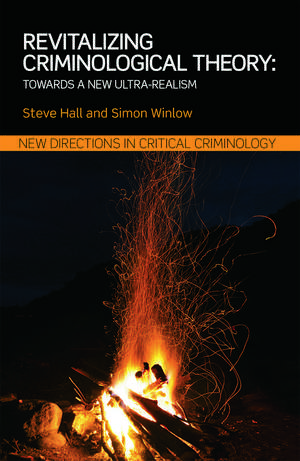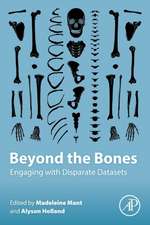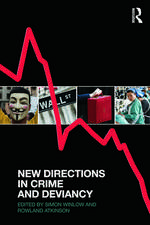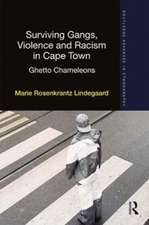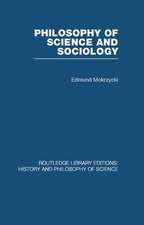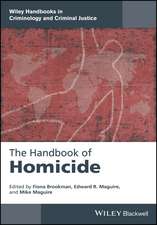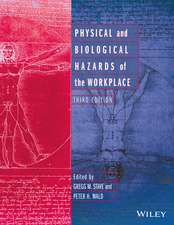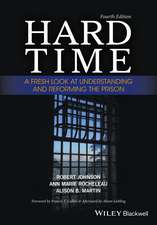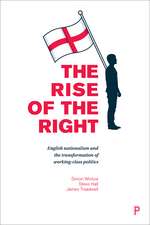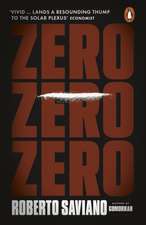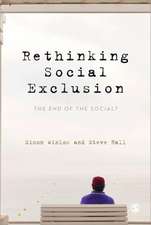Revitalizing Criminological Theory:: Towards a new Ultra-Realism: New Directions in Critical Criminology
Autor Steve Hall, Simon Winlowen Limba Engleză Paperback – 26 mai 2015
Combining new philosophical and psychosocial approaches with a clear understanding of the shape of contemporary global crime, this book presents an intellectual alternative to the currently dominant paradigms of conservatism, neoclassicism and left-liberalism. In using an advanced conception of "harm", Hall and Winlow provide original explanations of criminal motivations and make the first steps towards a paradigm shift that will help criminology to illuminate the reality of our times.
This book is essential reading for academics and students engaged in the study of criminology, sociology, criminological theory, social theory, the philosophy of social sciences and the history of crime.
| Toate formatele și edițiile | Preț | Express |
|---|---|---|
| Paperback (1) | 378.16 lei 6-8 săpt. | |
| Taylor & Francis – 26 mai 2015 | 378.16 lei 6-8 săpt. | |
| Hardback (1) | 760.95 lei 6-8 săpt. | |
| Taylor & Francis – 21 mai 2015 | 760.95 lei 6-8 săpt. |
Din seria New Directions in Critical Criminology
-
 Preț: 301.32 lei
Preț: 301.32 lei -
 Preț: 294.92 lei
Preț: 294.92 lei -
 Preț: 310.95 lei
Preț: 310.95 lei - 20%
 Preț: 265.24 lei
Preț: 265.24 lei -
 Preț: 357.22 lei
Preț: 357.22 lei -
 Preț: 362.26 lei
Preț: 362.26 lei -
 Preț: 412.70 lei
Preț: 412.70 lei -
 Preț: 380.84 lei
Preț: 380.84 lei -
 Preț: 410.09 lei
Preț: 410.09 lei -
 Preț: 398.99 lei
Preț: 398.99 lei - 31%
 Preț: 761.78 lei
Preț: 761.78 lei -
 Preț: 359.17 lei
Preț: 359.17 lei -
 Preț: 278.93 lei
Preț: 278.93 lei -
 Preț: 360.53 lei
Preț: 360.53 lei -
 Preț: 286.18 lei
Preț: 286.18 lei -
 Preț: 294.35 lei
Preț: 294.35 lei -
 Preț: 358.03 lei
Preț: 358.03 lei -
 Preț: 358.19 lei
Preț: 358.19 lei -
 Preț: 362.05 lei
Preț: 362.05 lei
Preț: 378.16 lei
Nou
Puncte Express: 567
Preț estimativ în valută:
72.37€ • 78.58$ • 60.79£
72.37€ • 78.58$ • 60.79£
Carte tipărită la comandă
Livrare economică 22 aprilie-06 mai
Preluare comenzi: 021 569.72.76
Specificații
ISBN-13: 9780415744362
ISBN-10: 0415744369
Pagini: 166
Ilustrații: 1 black & white illustrations, 2 black & white tables, 1 black & white line drawings
Dimensiuni: 129 x 198 x 9 mm
Greutate: 0.19 kg
Ediția:1
Editura: Taylor & Francis
Colecția Routledge
Seria New Directions in Critical Criminology
Locul publicării:Oxford, United Kingdom
ISBN-10: 0415744369
Pagini: 166
Ilustrații: 1 black & white illustrations, 2 black & white tables, 1 black & white line drawings
Dimensiuni: 129 x 198 x 9 mm
Greutate: 0.19 kg
Ediția:1
Editura: Taylor & Francis
Colecția Routledge
Seria New Directions in Critical Criminology
Locul publicării:Oxford, United Kingdom
Public țintă
Postgraduate and UndergraduateCuprins
1. Introduction 2. Mainstream Classical and Contemporary Theories 3. The Critical Tradition 4. The Radical Realist Response 5. Untangling the Politics of Criminological Theory 6. Ultra-Realist Criminological Theory 7. Conclusion: Approaching the Reality of Our Times.
Notă biografică
Steve Hall is Professor of Criminology at Teesside University and Co-Director of the Teesside Centre for Realist Criminology. In the 1970s he was a nomadic musician, general labourer and avid reader of anything political or philosophical. In the 1980s he worked with young offenders in the deindustrializing North-East of England, and he was politically active during the steelworks and mine closures in County Durham. In the 1990s he began teaching, researching and publishing. Essentially a criminologist, he has also published in the fields of sociology, history and radical philosophy. He is author of numerous articles and Theorizing Crime and Deviance (Sage, 2012), and co-author of Violent Night (Berg, 2006), Criminal Identities and Consumer Culture (Routledge, 2008), Rethinking Social Exclusion (Sage, 2013) and Riots and Political Protest (Routledge, 2015). He is co-editor of New Directions in Criminology (Routledge, 2012).
Simon Winlow is Professor of Criminology at Teesside University and Co-Director of the Teesside Centre for Realist Criminology. He completed his PhD at the University of Durham in the 1990s before commencing work as a researcher on the ESRC Violence Research Programme and a lecturer in criminology and sociology in various UK universities. He is the author of numerous articles and Badfellas (Berg, 2001), and co-author of Bouncers (Oxford University Press, 2003), Violent Night (Berg, 2006), Criminal Identities and Consumer Culture (Willan/Routledge, 2008), Rethinking Social Exclusion (Sage, 2013) and Riots and Political Protest (Routledge, 2015). He is co-editor of New Directions in Criminological Theory (Routledge, 2012) and New Directions in Crime and Deviancy (Routledge, 2012).
Simon Winlow is Professor of Criminology at Teesside University and Co-Director of the Teesside Centre for Realist Criminology. He completed his PhD at the University of Durham in the 1990s before commencing work as a researcher on the ESRC Violence Research Programme and a lecturer in criminology and sociology in various UK universities. He is the author of numerous articles and Badfellas (Berg, 2001), and co-author of Bouncers (Oxford University Press, 2003), Violent Night (Berg, 2006), Criminal Identities and Consumer Culture (Willan/Routledge, 2008), Rethinking Social Exclusion (Sage, 2013) and Riots and Political Protest (Routledge, 2015). He is co-editor of New Directions in Criminological Theory (Routledge, 2012) and New Directions in Crime and Deviancy (Routledge, 2012).
Recenzii
‘Steve Hall and Simon Winlow are quite simply the most important Criminologists working in Britain today. The breadth of their vision, their scholarship and the certainty of their conclusions makes them both impossible to ignore and vital to understand. Revitalizing Criminological Theory is the latest in a growing list of extraordinary, insightful, passionate and beautifully crafted works that they have produced and I urge anyone who cares about Criminology to read it.’ - Professor David Wilson, Founding Director Centre for Applied Criminology, Birmingham City University, UK
‘If you buy one criminology book this year make it Revitalizing Criminological Theory by Steve Hall and Simon Winlow. Criminological theory is at the crossroads, where bluesman Robert Johnson was supposed to have sold his soul to the devil. As the authors show in this book all previous criminology theory has sold its soul, including both neo-liberal and left liberal/postmodern criminology. If we are to move beyond this present dichotomy which has pervaded global criminology for decades, we need to follow the signpost out of this mess – it reads "ultra-realist criminology this way" and this text is its handbook.’ - Professor Steve Redhead, Faculty of Arts, Charles Sturt University, Australia
'A vital and timely contribution on why a new criminology is needed. This slim and important volume casts new theoretical light on underlying causes of neoliberal-based harms of the powerful and abject. A much needed breath of fresh thinking.' - J. Robert Lilly, Regents Professor of Sociology, Northern Kentucky University, USA
‘If you buy one criminology book this year make it Revitalizing Criminological Theory by Steve Hall and Simon Winlow. Criminological theory is at the crossroads, where bluesman Robert Johnson was supposed to have sold his soul to the devil. As the authors show in this book all previous criminology theory has sold its soul, including both neo-liberal and left liberal/postmodern criminology. If we are to move beyond this present dichotomy which has pervaded global criminology for decades, we need to follow the signpost out of this mess – it reads "ultra-realist criminology this way" and this text is its handbook.’ - Professor Steve Redhead, Faculty of Arts, Charles Sturt University, Australia
'A vital and timely contribution on why a new criminology is needed. This slim and important volume casts new theoretical light on underlying causes of neoliberal-based harms of the powerful and abject. A much needed breath of fresh thinking.' - J. Robert Lilly, Regents Professor of Sociology, Northern Kentucky University, USA
Descriere
This book offers a short and accessible introduction to Ultra-Realism: a unique and radical school of criminological thought that enhances the discipline’s ability to explain human motivations, construct insightful representations of reality and answer the fundamental question of why some human beings risk inflicting harm on others to further their own interests or achieve various ends.
